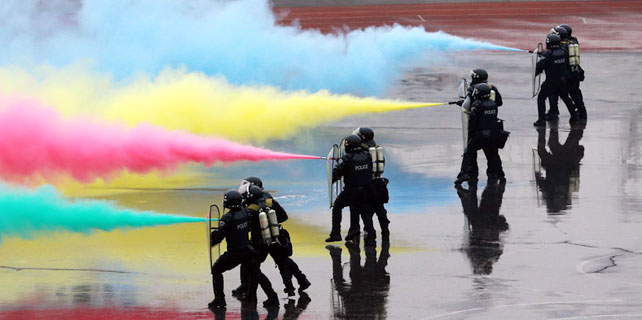Why China needs Xi Jinping as its core leader
 |
| A file photo of President Xi Jinping. [Photo/Xinhua] |
When, at a recent party plenum, President Xi Jinping was designated as “core” of the Communist Party’s Central Committee, some Western media were quick to condemn the rise of a new “strongman”. While recognising the significance of Xi as the core was correct, conjuring up visions of an emerging dictator was not.
I recalled my meeting with Xi years earlier, when he was still party secretary of Zhejiang province. Even then he was criticising “empty talk” and advising, “We should never overestimate our accomplishments or indulge ourselves in our achievements”. I took note of how Xi stressed, “We need to assess ourselves objectively”. Hardly, in retrospect, the ruminations of a gestating dictator.
To understand why Xi is now the core, one must appreciate the complex challenges of our times. China is now facing multiple challenges: domestically – slow growth, industrial overcapacity, endemic pollution, imbalanced development, income disparity, social injustice, social service demands; and, internationally – wars, regional conflicts, sluggish economies, volatile markets, trade protectionism, ethnic clashes, terrorism, geopolitical rivalries, and territorial disputes in the South and East China seas.
Most critically, because China must deepen its reforms to achieve its oft-promised goal of a “moderately prosperous society” by 2020, the resistance of entrenched interest groups must be overcome. More subtly, there is what some call a pervasive “soft resistance” – local officials who do not do their job and economic elites who migrate.
If reform had been progressing smoothly, then why strengthen central authority by investing Xi with the status of core leader? Xi has encountered obstacles; if there were no obstacles, there would be no need for a core leader.
I have been speaking to party -officials and theorists about Xi as core leader. In fact, the necessity of having a leadership core to maintain stability and expedite reform is the first and foremost of what I found to be four factors relating to Xi’s elevation.
A second factor is that not only does Xi have the responsibility for China’s transformation, he is also accountable for it. Moreover, he has shown courage in confronting and dismantling a vast, corrupt system of bribery, patronage and illicit wealth accretion.
A third factor is that Xi as the core does not end, and even may not diminish, the cardinal principle of “democratic centralism”. The party bolsters each of the concepts: encouraging the democratic solicitation of input and feedback from members, lower-ranked officials, and the public; and strengthening centralism through Xi’s leadership of the principal levers of power (his positions as party general secretary, head of state, chairman of the Central Military Commission, and head of the “leading groups” on reform, national security and internet security). True loyalty is telling leadership in private what one really believes is in their best interests, not repeating what one thinks leadership wants to hear
A fourth factor is that a core is required to manage the party more strictly and thereby give members and the public more confidence. Witness Xi’s relentless and unprecedented anti-corruption campaign, which is altering how government officials and industry managers work and even think. Let no one assume that Xi’s battle against corruption has been risk-free.
Significantly, these four factors undergirding Xi as the core leader map onto his overarching political framework, his strategic blueprint called “The Four Comprehensives” – a moderately prosperous society, reform, rule of law, party discipline.
Xi’s core status arises, we’re told, through the collective will of the party and the people. Becoming party core is not an automatic consequence of being general secretary; a core leader must fit the times and the status must be earned.
Speaking at a press conference following the 18th Central Committee’s sixth plenum last month, Huang Kunming, executive vice-minister of the committee’s Publicity Department, said that the “central and local departments as well as the military all expressed their support” for Xi’s position as party core, adding that this decision was “based on the valuable experience of the party and we feel keenly about it”.
Huang explained that “a core is needed to ensure that the party will be the governing party”, describing it as significant for upholding the Central Committee’s authority and maintaining the central, unified leadership of the party and for its “staying true to its mission”.
Therefore, party theorists explain, Xi as core leader is more a ratification of reality than a shift of fundamentals.






















